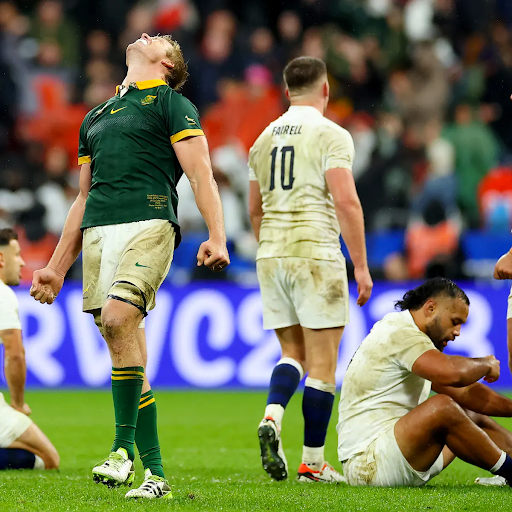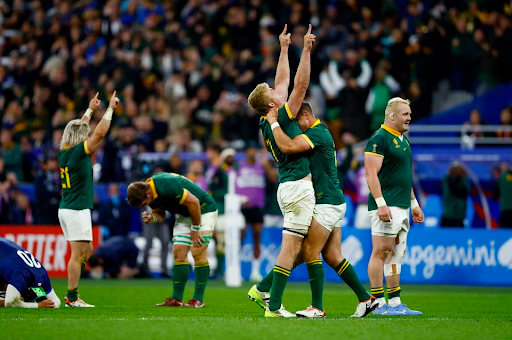
It might be the truest cliché in sports: the best teams find a way to win on their worst days. This was all I could think about after the South Africa Springboks eked out a 16–15 win over England in the Rugby World Cup semifinals on Oct. 21. At halftime, when England led 12–6, I was fairly confident of their victory. South Africa had shown nothing at that point to indicate anything different would happen. With nine minutes left, England led 15–6, with the Springboks still yet to mount anything resembling a serious challenge. I would have bet the entirety of my dwindling bank account on South Africa’s loss.
How quickly things change. To their credit, England looked intent on avoiding a repeat of the 2019 World Cup final (which they lost to South Africa 32–12) and went in with a great gameplan. Utilizing the wet conditions, they kicked high, either reclaiming it themselves or letting the Springboks bobble and drop the slippery ball. Essentially, England avoided playing traditional rugby — they sat back, defended well, and let South Africa make the errors.
And did they ever. Even the Springboks would agree that this was the worst they had played in some time. One of them would make a decent run, and almost unfailingly, they would bobble the ball forward (a penalty in rugby). They were atrocious under the high kicks from English boots. The performance was shockingly flat — many observed emotional fatigue after their desperately close quarterfinal win over France — especially considering that South Africa are the defending world champions and were heavily favored to make the final.
But great teams, as the cliché goes, find a way. Substitutes traditionally trickle onto the field at around the 60-minute mark, and the Springboks’ bench was clearly deeper than England’s. South Africa’s execution, if anything, got sharper after some of their starters went off. England couldn’t keep pace. South Africa started destroying England in the scrum (a kind of crouching wrestle in which the heavier members of each team push against each other), earning penalties that brought the ball closer to England’s goal line. The Springboks poured over the line for a try, Handre Pollard converted it, then Pollard nailed a long-range penalty to take the lead.
It felt like the turnaround had happened in about 15 seconds. England had the ball around the halfway line with time running out, but South Africa’s defense prevented them from gaining any ground. I was stunned when the final whistle blew — the turnaround had felt so sudden, violent almost, that I had a hard time believing what I had just watched. “Most undeserving win I’ve ever seen,” a UK friend texted me.

While I’m sure the speed with which victory morphed into defeat for England was startling, a South Africa win was the best outcome for everyone involved (well, except England fans). English players were disappointed, but had already surpassed expectations by making the semifinals and seemed more proud by their efforts than anything. And South Africa gets to reignite rugby’s biggest, most storied rivalry by taking on New Zealand in the final.
About that rivalry: South Africa and New Zealand have played 105 times total (62 wins for New Zealand, 39 for South Africa, four draws) and five times in World Cups. The most historically consequential meeting came in the 1995 final, which is heavily featured in the 2009 film
Invictus
, when South Africa rebounded from a late 12–9 deficit to win 15–12 in extra time. The final and tournament as a whole were immensely meaningful to the country, which had repealed apartheid legislation in 1991 but was still shaking off the residue of the racist institution. Nelson Mandela had followed and supported the Springboks closely in 1995.
Since then, New Zealand have seized their revenge in the 2015 World Cup semifinal and became the first team to win three world cups that same year. South Africa won their third in 2019. Though the rivalry has been hotly contested for decades, now, there is a healthy respect between the teams. They recognize each other as equals and their games as an honor; the play itself is fierce but rarely imbued with any ill will, which is sometimes the case when New Zealand play Australia, another major rival.
This year’s edition of the rivalry is being touted as a 50–50 game, but it seems that New Zealand have the advantage. South Africa are coming off their second emotionally exhausting win in a row — they are the first-ever team to make the World Cup final after winning their quarterfinal and semifinal by one point each — and may not have much left to give. New Zealand should be relatively fresh after their dominant 44–6 win over Argentina in the other semifinal.
Still, it is hard to rule South Africa out. Despite the Springboks performing so far below their best in the semifinal, watching them grit their way over the line was oddly spellbinding. This match could not have been more different from their quarterfinal win over France, which was equally close — in that game, South Africa was grinding down France even as they trailed on the scoreboard. Against England, they looked hopeless until the final eighth of the game, when all of a sudden everything fell into place. They have such an intimate understanding of how to perform well in the most pivotal moments and such depth in their substitute players that at times towards the end of games their victory can seem inevitable.
Regardless, one thing is for sure: if South Africa cannot find the reserves for 80 minutes of their very best rugby, it will be New Zealand’s World Cup this coming Saturday.
























